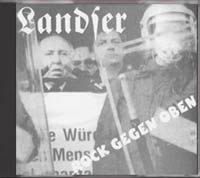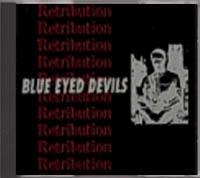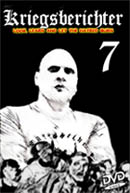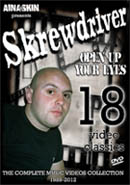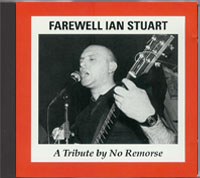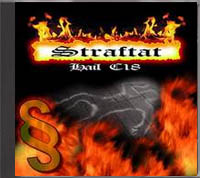Skrewdriver HistorySKREWDRIVER - FROM PUNK TO PATRIOTISM Ian Stuart's Skrewdriver, The epitome of Racist Rock 'n' Roll, it started in Blackpool during the 1977 Punk Rock Revolution. Soon after appearing on the Punk scene the band were signed to Chiswick records, an independent label headed by Ted Carroll, formerly the manager of Thin Lizzy. Skrewdriver played their debut London gig at the Roxy club on the 16th of April 1977. Before setting in London it was decided that Skrewdriver would play a farewell gig in Blackpool. When the local council found out, the group was banned and the story made front page news. On hearing 'You're so dumb', the bands debut single one councilor remarked that 'anyone in their right mind wouldn't listen to it". Ian Stuart's reply came later in the form of track 8 on the All Skrewed Up LP. Teddy Boys were the main focus of the group’s disgruntlement when Skrewdriver were featured on London Weekend Television's Year of Punk Programme. Skrewdriver turned Skinhead and gigged with the likes of Sham 69 who also attracted a Skinhead audience. It was then that rivalries began to surface. Things had been going particularly well for Skrewdriver. There were regular gig, they had recorded two singles and an album, appeared on television and produced a specially recorded session for John Peel's Radio One show. But all this success was about to come to an abrupt end. Trouble at gigs and the music media's dislike of their Skinhead image saw them lose out on two major touring slots, lose the backing of Chiswick and found themselves banned from every venue in London. Chickswick told the band to change their image and sent them to a farm in Peterborough to prepare for a new LP. It soon became apparent that both politically and musically the two parties were pulling in different directions and in the autumn of '78 they eventually went their separate ways. Ian returned north and a year later recorded the ' Built up Knocked down' EP for a small independent label in Manchester. Musically it was quite a revelation for the former Punks. For the next three years Ian Stuart toyed with the idea of once again re-forming Skrewdriver. Back and forth to London he was now getting involved in politics of the racist variety. By now Ian Stuart had become a leading member of the Blackpool branch of the National Front and later joined the British Movement. A little disappointed that the NF hadn't rushed to support his idea of a new band called 'Britain', Ian Stuart concentrated on writing new material. In London Ian was lodging with Suggs. The two had become good friends when Suggs worked as a roadie for Skrewdriver. Suggs, who was now finding fame with chart-toppers Madness, asked Ian to help out in the making of 'Take it or leave it' , a filmed about the group's early days. Five years later the British press though they'd embarrass Suggs by producing a front page story linking him with Ian Stuart, who by his time had become a major figure in the right-wing movement. In the summer of '82 the Come back was on. Skrewdriver were back, Ian Stuart had recruited a whole new London band line-up. With the backing of East London Skinhead shop 'The Last Resort' the band had recorded two tracks for the 'United Skins' compilation album and another two for their first single release in three years titled appropriately 'Back with a Bang'. The 100 club set the scene for Skrewdriver's return, the whole band appearing dressed in black with red braces and Union Jack patches. Those present were witnessing a whole new phenomenon. The rumours were soon confirmed - Skrewdriver were a National Front band. Ian Stuart began to make speeches attacking immigration between songs. The whole music establishment was in a state of shock when the National Front formed White Noise records and produced it's first single - The White Power EP. The Skinheads loved it. Skrewdriver were attracting the biggest crowds at all Punk and Skinheads concerts in the capital. The National Front was not slow in seizing on this opportunity. News of the band appeared in all its publications and the NF resurrected its musical wing under the banner of 'Rock against Communism' to organize gigs. The next single was issued to it's eager fan base, entitled 'The Voice of Britain' which was visually striking and contained a battle cry being echoed by an ever growing army of Young Nationalists. Whilst rehearsing for the Hail the New Dawn LP the band went through another change of personnel. And the change paid dividends with the group producing what has been acclaimed as their greatest Nationalist anthem. Free my Land. With a record contract signed and the new line-up in place, Skrewdriver entered the studio and laid down 14 tracks that would become the 'Hail the New Dawn' LP. Well received in Britain, the album helped to launch the racist music scene all over Europe, America and Australia - showing that the bands could say what they wanted and still get their records released. As with the seventies, trouble was never far away. Anti-racist campaigners were actively trying to remove Ian from the area where he lived and after a scuffle at Kings Cross railway station Ian was arrested. On the 11th of December 1985 Ian Stuart received a twelve months jail term and was sent to Wormwood Scrubbs Prison. By this time the National Front were generating healthy revenue from the sale of Skrewdriver records and the publication of White Noise magazine. However, the National Front was entering turbulent times, with splits emerging by the day. This didn't really affect the now established racist music set-up. Although Ian was in jail, the release of the 'Blood & Honour' LP and the support of new, up and coming Skinhead bands ensured that the music scene remained strong. On release from Prison Ian Stuart got straight back into the swing of things playing a string of gigs. He had spent his time in jail writing songs and replying to the hundreds of letters he received from supporters all over the world. It wasn't long before Skrewdriver were back in the studio to record what is generally accepted as their best album - The album was called 'White Rider'. The LP was slick, modern and very professional. A far cry from what most people assumed to be their genre, minus the political content, and with the relevant marketing, it would have no doubt achieved high ratings in the album charts. Internal bickering in the National Front coupled with mismanagement of White Noise saw Ian Stuart break away from the NF to form a new independent voice of Rock against Communism called BLOOD & HONOUR. The Front tried their best to salvage the situation but found themselves on a hiding to nothing. Blood & Honour had brought a new buzz to the scene and bore witness to some its most successful times. Stores in fashionable Carnaby Street were stocking the bands records and T-shirt; smaller venues were no longer large enough to cope with the ever increasing turn-outs. Ian Stuart found himself being chased for interviews by various national newspapers and TV companies. Hot on the hells of White Rider, the band was back in studio. The follow-up album After the Fire was a little more raucous and lyrically direct, hitting out at the Left-wing in particular. Ian, who by this time was becoming public enemy number one, was involved in another incident that put him behind bars. After 3 months of being held on remand Ian was overjoyed when the judge dismissed the case due to lack of evidence. On release from jail Ian continued with various projects, one being a group called 'The Klansmen' featuring some big name Psychobilly musicians (of Demented Are Go and Krewmen). Ian Stuart was growing tired of the hassle he faced everyday in London. In 1989 he packed-up and moved north making his new base in the East Midlands. Skrewdriver were still attracting fanatical support in Europe. Germany in particular was hosting major events, amidst a volatile atmosphere of tension due to the country's immigration policy. Immigrant hostels were attacked, the situation was spiraling out of control. A Nationalist Backlash was under way. Two days before a Skrewdriver concert in Cottbus, former Eastern Germany, a Communist was stabbed in a street battle that resulted in the band being arrested and thrown in Jail. Totally unaware of the situation Ian Stuart was woken up at gun-point and taken to the local police station. He was later released, and the concert went ahead with his band still in jail (at this concert Ian renamed Free my Land into Free my Band). On return to the UK Ian Stuart was bombarded by a press onslaught blaming the group for causing trouble. Ian set about a campaign to free his band and released a mini-LP titled 'Rough Justice Freedom for the Cottbus six'. Over two months after being arrested the six were freed on Bail, but had to wait another year before the case thrown out due to lack of evidence. To kick-start the UK scene, London Blood & Honour decided to repeat the success of the Main Event concert held in 1989 where top RAC bands gathered to play to a major gig on the outskirts of London, The Left-wing who had claimed that Skrewdriver would never play in London again. The concert featuring Skrewdriver, No Remorse and Sweden's Dirlewanger received a lot of media coverage. Communist groups planned a demonstration and the Police were desperate to find out the details of where the concert was to be held. A year on from Waterloo, Ian Stuart was feeling the pressure, the like of which he hadn't experienced since his days in London. Angry at the fact that Blood & Honour managed to pull of a major concert like Waterloo, The Police and Communists stepped up their war on Skrewdriver, and when Nottingham Blood & Honour announced that they were staging and open air Festival, their enemies set about their plans to stop the show. Ian Stuart was arrested and served with an injunction not to play; the venue was sealed off by police who also confiscated the equipment. It was the biggest Police operation in the area since the Miners strikes in the early eighties. Skrewdriver began recording their last LP 'Hail Victory'. It was a vast improvement on recent releases and featured certain ironies such as the song 'Time to Die'. Death was also a subject Ian Stuart had touched on in recent interviews. On the evening of September 23rd 1993 Ian Stuart and few friends were returning home from an evening out in Burton on Trent, Staffordshire, when their car suddenly spun out of control and ended up in a ditch. Steven Flint died instantly, three others received neck and back injuries. At 10.40 the following morning at Queen’s medical centre, Nottingham, Ian Stuart was pronounced dead. For supporters of Skrewdriver it was the equivalent to people hearing about the death of JFK. Ian Stuart, cult figure, hero to Nationalists had built a movement and created a truly alternative scene. Now he was gone, leaving a legacy of Nationalist rock. 'We'll always be the same and I hope all the supporters of the band will stay the same.' - Ian Stuart |


